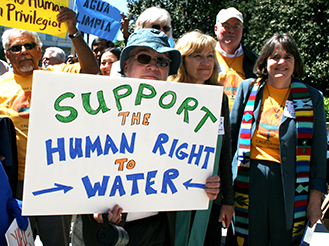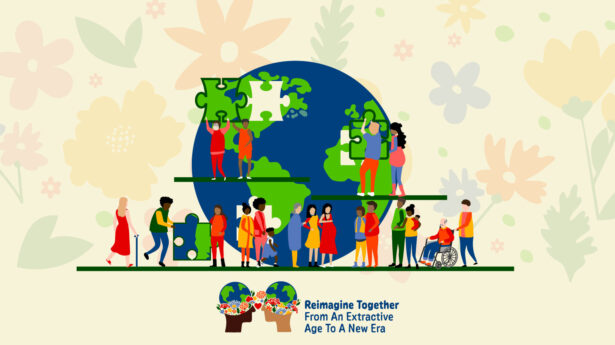The Unitarian Universalist Service Committee advances human rights through grassroots collaborations.
Drop, Ripple, Wave

April 9, 2015
Building Resilience to Climate Change in California
“Just as ripples spread out when a single pebble is dropped into water, the actions of individuals can have far-reaching effects.” —Dalai Lama
For more than 800,000 people in California, getting clean water — for drinking, for cooking, for bathing — is not easy. There’s the four-year drought. There’s the prioritization of industrial agriculture’s water needs. Then there’s the contaminated groundwater that was a problem for thousands of people well before the drought took hold.
The bad news (as if there weren’t enough already): climate change is only making things worse. The good news: UUSC is working with the Environmental Justice Coalition for Water (ECJW) to protect the human right to water and build resiliency to the effects of climate change.
Climate change — so what?
Despite the unwillingness of some people to admit it, climate change is real. And as the New York Times Editorial Board wrote in “Preparing for Tomorrow’s Storms,” a recent editorial about the challenges facing California, “In the coming years, climate change is likely to render every part of the country more vulnerable to environmental disasters.” What that means? More drought. More intense and catastrophic storms. More unpredictable growing seasons.
Patricia Jones, UUSC’s senior program leader for the human right to water, says, “I think one of the biggest challenges we’re facing is that climate change impacts are coming much more severely and much quicker than we thought, and we’re not ready.”
It boils down to water
One of the most significant effects of climate change is on water. UN-Water reports that climate change will impact people mostly through water. “Between 1991 and 2000 over 665,000 people died in 2,557 natural disasters, of which 90% were water related events. Adaptation to climate change is mainly about better water management,” states UN-Water’s 2013 fact sheet on climate change.
What this looks like for people in California and surrounding areas: “Decreased access to fresh water is a primary risk for communities hit by climate change in the southwestern United States and worldwide,” wrote Jones in a March UU World article.
Many communities in California are no stranger to decreased access to fresh water. Just last year, Omar Carrillo, policy analyst for the Community Water Center, a UUSC partner, said, “The silver lining to the three-year drought in California? We don’t have to worry about drinking contaminated groundwater, because we don’t have any.” He delivered those words during the national consultation on human rights and climate change that was held in California last October. An example of his point: in East Porterville, 400 wells went dry, leaving 1,000 people without water. And that’s just one town.
UUSC has been working with partners and communities in California who have faced contaminated water — and the financial costs and health risks that come with it — for years. The daily struggle for clean water that communities like Seville and others in Tulare County alone endure was a major motivating factor behind the advocacy to successfully pass the 2012 Human Right to Water Act of California.
Adding climate change to the equation only makes the situation worse. As the New York Times editorial lays out, 25 million people rely on the rain and melting snow of the San Francisco Bay Delta watershed for safe drinking water. While the drought is already diminishing that, the more intense storms brought on by climate change endanger that freshwater source via potential breach of the levees that protect it.
What’s being done about that? Not enough and not fast enough. One of the major problems: “Water for all, including low-income people, was largely ignored in the climate change policy of the last 10 years — and it’s still being ignored while we work on energy solutions,” says Jones.
Who pays the price
The lack of attention to water in climate change policy is not the only major problem, though. Another vital issue is the disproportionate impact experienced by people already bearing many burdens. The 2014 U.N. Resolution on Human Rights and Climate Change states:
While these implications [of climate change on human rights] affect individuals and communities around the world, the adverse effects of climate change will be felt most acutely by those segments of the population that are already in vulnerable situations owing to factors such as geography, poverty, gender, age, indigenous or minority status and disability.
In California, this means that it is especially low-income communities of color who are affected — who can’t trust the water that comes out of their taps (if it does). Who are forced to buy bottled water that they can’t afford for their daily needs. Who are forced to decide between paying the rent and buying water.
“Discrimination and lack of access to safe affordable water will only get worse with climate change — unless we don’t let that happen. It is happening in the drought negotiations in California, and it is only the beginning,” says Jones.
Building community power and resilience
It bears repeating: “unless we don’t let that happen.” That is exactly why UUSC is partnering with the Environmental Justice Coalition for Water (ECJW) to take on these challenges in California. The partnership — and the larger coalition that each organization is part of — has already seen success and is working toward more progress in protecting the human right to water in the face of climate change.
The previous 2012 legislative victory is making a difference now, during the drought negotiations. Jones explains, “Because of the Human Right to Water Act, our community partners are no longer outside the door, outside the building, not even knowing the meetings are happening. They are in the room and at the table negotiating for their interests.” That means the voices of the people most affected by contaminated water — and no water at all — are being heard as decisions get made by government agencies active in setting water policy and allocating funding in the midst of the drought.
UUSC is supporting EJCW in a wide range of activities, including community organizing, advocating for fair funding, and exploring waterless sanitation systems. As Jones wrote in UU World, “EJCW is spearheading major initiatives with foundations, academic think tanks at Stanford University and the University of California, and social justice organizers to forge a path for climate resiliency in the drought negotiations and beyond. This groundbreaking effort is different from most climate change work because it brings the climate resiliency movement and water resources management together, with a focus on water justice.”
Members and supporters of UUSC are taking action, too, by raising awareness and funds for this work through the Blue Buckets campaign, part of UUSC’s Climate Justice Sunday program. This kind of support can make the following — and more — possible:
- Tankers full of water can provide families with water for cooking, cleaning, and drinking.
- Busloads of people from communities that lack safe water can go to Sacramento to speak to elected officials during drought negotiations.
- EJCW can continue to explore innovative solutions to the water crisis.
- Research on water affordability and discrimination can be undertaken.
Drop, ripple, wave
Climate change is not going away. But neither is the climate justice movement. Case in point: UUSC has joined with several other UU organizations and thousands of people of faith and conscience to take collective long-term action for climate justice through the Commit2Respond initiative.
Jones wrote in UU World: “I believe there is hope. We can scale up innovative models coming from frontline communities around the world—if we make sure climate negotiations include adaptation funding that doesn’t stop at the borders of the developed countries.”
Actions can add up. Positive change can be achieved. UUSC will continue to work with partners and supporters who are dedicated to defending the rights of people most affected by climate change and to protecting the human right to water.

